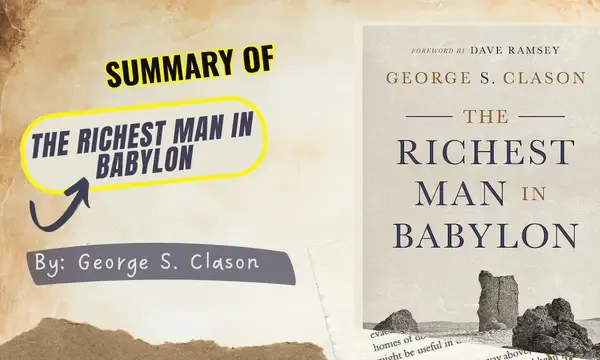The Richest Man in Babylon by George S Clason is a personal finance book that offers timeless financial wisdom through a collection of parables set in ancient Babylon. The main theme of the book revolves around the principles of wealth accumulation, financial management, and the importance of taking control of one's finances.
 |
| Summary of The Richest Man in Babylon by George S. Clason |
The general idea of the book The Richest Man in Babylon
Start thy purse to fattening: The book emphasizes the importance of saving and highlights that a portion of every income should be saved for future investments.
It advises individuals to save at least 10% of their income and gradually increase the amount over time.
Control thy expenditures: The book advocates for living within one's means and spending wisely.
It suggests distinguishing between wants and needs and prioritizing essential expenses over luxuries.
Make thy gold multiply: The book emphasizes the significance of investing and growing one's wealth through wise investment decisions.
It encourages individuals to seek opportunities for profitable investments and to diversify their investments to mitigate risks.
Guard thy treasures from loss: The book stresses the importance of protecting one's wealth through careful consideration and sound financial judgment.
It advises against impulsive or speculative investments and recommends seeking advice from knowledgeable individuals.
Make of thy dwelling a profitable investment: The book highlights the importance of owning property and investing in one's home.
It suggests that owning property can provide stability, security, and potential income through rentals.
About the author of The Richest Man in Babylon
George S. Clason was a writer, businessman, and financial advisor. He is best known for his work on personal finance, particularly "The Richest Man in Babylon." Clason's book draws upon historical Babylonian insights to present timeless financial principles.
Read More:
Summary of Rich Dad Poor Dad by Robert Kiyosaki
Summary of Fundamentals of Business by Stephen Scrapback
The book The Richest Man in Babylon in relation to other books
"The Richest Man in Babylon" stands out among other personal finance books due to its unique presentation through ancient parables. It combines engaging storytelling with practical financial advice, making it accessible and enjoyable for readers.
Chapters of the book The Richest Man in Babylon
The Man Who Desired Gold: This chapter introduces the story of Bansir, a chariot builder, who desires wealth but struggles to accumulate it. Through his encounters with Arkad, the richest man in Babylon, Bansir learns the first principle of saving.
The Richest Man in Babylon: Arkad shares his seven cures for a lean purse. He emphasizes saving a portion of one's income, investing wisely, seeking expert advice, avoiding risky investments, and growing wealth gradually over time.
Seven Cures for a Lean Purse: Arkad delves deeper into the seven principles of financial success, which include starting to save early, earning more through knowledge and skills, multiplying wealth through investments, safeguarding assets, ensuring a home as a profitable investment, providing for the future, and increasing one's ability to earn.
Meet the Goddess of Good Luck: In this chapter, the story focuses on Kobbi, a musician who aspires to be rich. Through his encounters with the goddess of good luck, he realizes that luck favors those who are prepared and have acquired the necessary knowledge and skills.
The Five Laws of Gold: Arkad teaches his son Nomasir about the five essential laws of gold, emphasizing the importance of saving, investing wisely, avoiding losses, seeking expert advice, and being cautious with one's investments.
Conclusions of the book The Richest Man in Babylon
Saving a portion of your income is crucial for wealth accumulation.
Control your expenses and prioritize essential needs over luxuries.
Invest wisely and diversify your investments to grow your wealth.
Seek advice from knowledgeable individuals before making financial decisions.
Protect your wealth from potential losses and be cautious with speculative investments.
Owning property can provide stability and potential income.
The audience of The Richest Man in Babylon
This book is suitable for individuals of all ages and financial backgrounds who wish to improve their financial literacy and learn timeless principles for wealth accumulation and financial management. It is particularly relevant for those who prefer learning through stories and parables.
The date of publication of The Richest Man in Babylon
"The Richest Man in Babylon" was first published in 1926 and has been republished multiple times since then. The book is published by Penguin Books.
Recommendations for other books
- "Rich Dad Poor Dad" by Robert T. Kiyosaki
- "Think and Grow Rich" by Napoleon Hill.
- "The Millionaire Next Door" by Thomas J. Stanley and William D. Danko.
